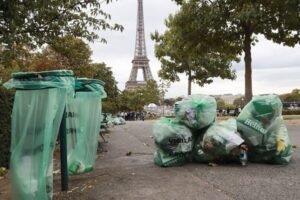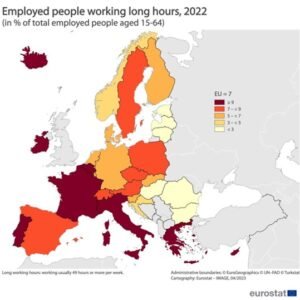Weekly Roundup

Source: ec.europa.eu
Wildfires: EU doubles rescEU firefighting fleet for summer 2023
The EU is doubling its rescEU aerial firefighting fleet for this year’s wildfire season, with 24 aeroplanes and 4 helicopters from 10 Member States, including Germany, Sweden, and Cyprus. They have also developed a Wildfire Prevention Action Plan and launched a Wildfire Peer Review Assessment Methodology to assess and improve wildfire prevention capabilities. Additionally, a Wildfires Support Team will provide monitoring and analysis during the season. The EU coordinates assistance through the Civil Protection Mechanism and has the rescEU firefighting reserve for additional support. The goal is to save lives and protect the environment from wildfires.
Check here to read more about the rescEU aerial firefighting fleet.

Source: Washingtonpost.com
Nations meet to strike plastic pollution treaty
Countries are engaged in talks to develop a global treaty to address plastic pollution, but concerns have arisen regarding the focus on recycling instead of reducing plastic production. Norway’s climate minister emphasizes the need to decrease the manufacturing of “virgin plastic” and promote a circular economy. Environmental groups argue that production should be significantly slashed to tackle the issue effectively. Plastic pollution poses a severe environmental problem, with a large portion ending up in landfills or incinerated. Fossil fuel companies continue to invest in plastic production, hindering efforts to combat pollution. Some countries, including the US and Saudi Arabia, have shown resistance and low ambition in the negotiations.
The High Ambition Coalition aims for a comprehensive approach to end plastic pollution by 2040, addressing health concerns related to toxic chemicals in plastics. The focus should be on reducing pollution-prone plastic types and developing recyclable alternatives. Find out more here.

Source: uk.news.yahoo.com
EU trade agreement ‘fatigue’ slowing down ratification of deals
The European Union (EU) is experiencing ‘fatigue’ regarding its trade agreements with various countries as negotiations have been unsuccessful and lengthy. Some member states are questioning the benefits of these deals and reconsidering their commitment to ongoing negotiations. The EU trade ministers gathered to discuss stalled talks, but doubts about their value have intensified. While some attribute the slowdown to the need to protect European interests, others highlight the diminishing benefits of these wide-ranging agreements due to low tariff levels and the backlash against globalization. The EU’s focus on free trade is now being reevaluated in light of the current geopolitical situation and disruptions caused by the COVID-19 pandemic.
Read more about free trade deals here.

Source: https://www.dailysabah.com/
Global rising of waste generation
Global waste production is on the increase worldwide. In the European Union, individuals and businesses generate over 2 billion tonnes of waste annually, amounting to approximately 4.8 tonnes per person, with construction, mining, and industrial activities being the primary contributors. On average, each European produces around half a tonne of municipal waste each year, with less than half of it being recycled. This waste has detrimental impacts on our environment, biodiversity, and overall well-being, in addition to being a costly burden to manage. It also highlights our inefficient utilization of the Earth’s limited resources.
Learn more here.

Source: https://victim-support.eu/
Victim Support Europe 2023 Annual Conference
The VSE Annual Conference stands as a prominent and impactful gathering within the global victim support community. It serves as a platform where challenges faced by victims are addressed, innovative solutions are developed, and new support practices are introduced. This event brings together frontline victim support workers, policymakers, law enforcement professionals, technology providers, academics, journalists, and civil society activists, providing a valuable opportunity to foster connections and advance the field. Whether you aim to enhance your services, showcase a product, or share an idea that benefits victims, this conference offers a conducive environment for networking and collaboration.
In this era of profound uncertainty, where essential democratic rights and matters of civil and minority rights face significant challenges, numerous industries, sectors, and the world as a whole unite to contemplate a fundamental question: Where to next?
More information about the conference can be found here.

Source: https://euagenda.eu/news/870527
Employed people working long hours
In 2022, approximately 7% of employed individuals worldwide dedicated extended hours to their work, exceeding the threshold of 49 hours per week. Greece stood out as the country with the highest percentage, reaching 13%, followed by France and Cyprus at 10%. Conversely, Bulgaria, Lithuania, and Latvia displayed the lowest rates, with only 1% of their workforce engaged in such long working hours. These figures highlight the disparities in work cultures and the importance placed on work-life balance across different nations. Understanding these variations can contribute to discussions surrounding labour policies and the well-being of employees.
Read more about the research here.
Prepared by Ceyda Hos and Olivér Berecz

